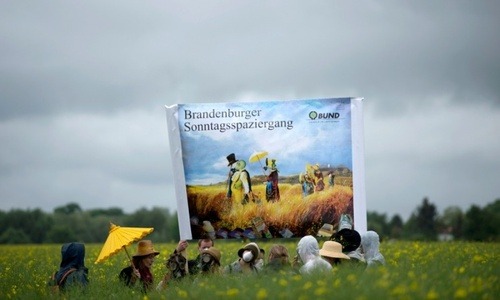‘Suppressed’ EU report could have banned harmful pesticides worth billions
Science paper recommended ways of identifying hormone-mimicking chemicals in pesticides linked to foetal abnormalities, genital mutations, infertility and other diseases including cancer
As many as 31 pesticides with a value running into billions of pounds could have been banned because of potential health risks, if a blocked EU paper on hormone-mimicking chemicals had been acted upon, the Guardian has learned.
The science paper, seen by the Guardian, recommends ways of identifying and categorising the endocrine-disrupting chemicals (EDCs) that scientists link to a rise in foetal abnormalities, genital mutations, infertility, and adverse health effects ranging from cancer to IQ loss.
Commission sources say that the paper was buried by top EU officials under pressure from big chemical firms which use EDCs in toiletries, plastics and cosmetics, despite an annual health cost that studies peg at hundreds of millions of euros.

‘No poison on our fields’ near Fahrland, Germany.
The unpublished EU paper says that the risks associated with exposure to even low-potency EDCs is so great that potency alone should not serve as a basis for chemicals being approved for use. Its proposed criteria for categorisations of EDCs – along with a strategy for implementing them – was supposed to have enabled EU bans of hazardous substances to take place last year.
But commission officials say that under pressure from major chemical industry players, such as Bayer and BASF, the criteria were blocked. In their place, less stringent options emerged, along with a plan for an impact assessment that is not expected to be finalised until 2016.
“We were ready to go with the criteria and a strategy proposal as well but we we were told to forget about it by the secretary general’s office,” a commission source told the Guardian.
“Effectively the criteria were suppressed. We allowed the biocides and pesticides legislation to roll over.”
Last month, 11 MEPs complained in a cross-party letter to the health and food safety commissioner, Vytenis Andriukaitis, about the EU’s failure to honour its mandate and adopt the EDC criteria.
This was supposed to have happened by the end of 2013, and is now the subject of court proceedings brought by Sweden, the European parliament and council.
But Catherine Day, the EU’s powerful secretary general, laid the blame for the delay on poor communication between the commission’s health (Sanco) and environment (Envi) departments, which shared responsibility for the file.
“They were working in different directions, which made no sense so the secretariat-general did intervene to force them to do a joint impact assessment with the aim of coming up with one analysis on which the commission could base itself,” she told the Guardian.
“The commission is under no obligation to publish internal working papers,” another commission spokesperson said. “As you know, the European commission acts in full independence and in the general European interest.”
A counter-narrative popularised in the film Endocrination holds that Sanco was brought into the policy process as a proxy for industry interests.
“We had a lot of arguments with Sanco,” a commission source said. “At one point, the secretary general intervened to halt the process and then basically it was just stopped. We were told that we and Sanco had to bang our heads together. But when the two directorates eventually – and reluctantly – reached an agreement,even that was blocked by the secretary general.”
